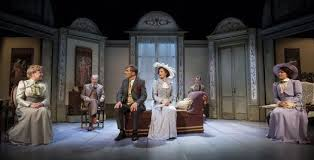Introduction :
Pygmalion is a comic play about a language expert who tries to turn a rough-speaking flower girl into a refined lady. Even though it's not as tricky as some of Shaw's other plays, it still asks big questions about things like class, how people act, and relationships between men and women.Shaw wanted to avoid unfair criticism from London critics, so he first put on the play in Germany. When it finally reached London in 1914, people liked it a lot, making Shaw even more popular.
The title "Pygmalion" refers to an old story from Greek mythology about a king who fell in love with a statue he made. He asked the gods to bring it to life, and they did. He then married the now living statue.
To keep people guessing, Shaw acted like Pygmalion was an old-fashioned play, like those from ancient Greece. He even kept his name off the playbill and picked an actress new to playing a lower-class character. This trickery was inspired by the ancient Greek myth of Pygmalion, where a guy makes a statue come to life.
Even though Pygmalion wasn't Shaw's most shocking play, it still caused a stir when it first came out. People were surprised when the flower girl Liza said a word ("bloody") that had never been said on that stage before. But instead of being shocked, the audience laughed at her boldness.
Historical Context :
Act 1
The play starts on a rainy night in London. Two women, a mother and her daughter, are seeking shelter near a church in Covent Garden, which is known for its markets. There's also a brother and sister, Freddie and his sister, who have a typical sibling relationship, where one thinks the other isn't good enough. The flower girl they meet contrasts with the well-dressed women. She speaks differently, but her looks aren't worse than theirs.
The playwright, George Bernard Shaw, wanted to show that language can break down class barriers. He starts by spelling the flower girl's words the way she says them, to show how she speaks. But as the play goes on, he stops doing this, showing that proper speech can be taught.
Shaw also talks about how people react to the flower girl. At first, they feel sorry for her, but then they start finding her entertaining. There's a guy who can tell where people are from by how they talk. Shaw shows that people judge others based on how they speak.
The flower girl argues that her character is just as important as any lady's, even though she's poor and speaks differently. Shaw suggests that language can be learned, so class distinctions aren't permanent. In this act, we meet the main characters: Higgins, who is smart but arrogant, Pickering, who is patient and kind, and the Eynsford Hills, a rich family who are struggling with money.
The theme of the act is how language affects social acceptance. The flower girl is seen as poor and uneducated because of how she speaks, even though she's a good person. Shaw suggests that learning proper speech can help people move up in society, even if they're still poor.
Act 2
In this scene, Pickering visits Higgins, and Eliza comes to ask for speech lessons. Higgins makes a bet with Pickering that he can turn Eliza into a proper lady in six months. At first, Eliza is wary of Higgins' intentions, but he convinces her with treats and promises.
Pickering is polite and kind, unlike Higgins, who is rough and insensitive. Eliza emphasizes that she's a good person, showing that her virtue matters to her. She speaks differently from the others, indicating her lower education and upbringing. Mrs. Pearce, the servant, is more refined but still below Higgins in social status. She's shocked by Higgins' plan to change Eliza.
Later, Eliza's father, Alfred Doolittle, arrives and tries to blackmail Higgins. Higgins cleverly offers Eliza back to him, and they discuss the poor and their struggles. Doolittle is smart and witty, much like Higgins. He dislikes the idea of having too much money and responsibility.
When Eliza comes down after a bath, her father hardly recognizes her, and everyone is amazed by her transformation. She argues with her father, showing their strained relationship. Doolittle doesn't respect his daughter or her choices, and Eliza is wary of him.
Act 3
In this scene, Mrs. Higgins scolds her son for visiting on her at-home day, a day when upper-class ladies receive visitors. This shows the rigid social structure of the time, where people had specific days for socializing and charity work. When Eliza joins Mrs. Higgins and the Eynsford Hills, she impresses them all. Mrs. Higgins' son dismisses Eliza's rough language as trendy, and Clara Eynsford Hill eagerly adopts it to seem fashionable. Higgins encourages her to spread the trend, showing how shallow and silly the upper class can be.
Mrs. Higgins, Henry's mother, knows her son's behavior well enough to keep him away from her guests. She worries about Eliza's well-being, seeing her as an object of amusement for Henry and Pickering. She compares them to babies playing with a doll, suggesting they see Eliza as just a toy.
Later, Eliza passes another test, despite Higgins acknowledging her lower class background. His guests refuse to believe that someone like Eliza could be taught to be graceful and charming, showing their snobbishness.
Act 4
Act 5


.jpg)





No comments:
Post a Comment